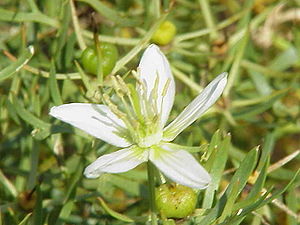ἁρμαλά
English (LSJ)
= πήγανον ἄγριον, wild rue, Dsc.3.46; Syrian for πήγανον κηπαῖον, Ps.-Dsc.3.45:—also ἀρμαρά, PMag.Par.1.1294,1990. (Cf. Arabic harmal 'rue'.)
Spanish (DGE)
• Alolema(s): ἅρμαλα Gal.19.725; tb. ἄρμολα Gal.12.82; ἄρμαρα PMag.4.1294, 1990
bot.
1 ruda, Ruta chalepensis L., Ps.Dsc.3.45.
2 alhama, ruda hármala, Peganum harmala L., Dsc.3.46, Gal.ll.cc.
•sin identificar PMag.ll.cc.
• Etimología: Del ár. ḥarmal.
Wikipedia EN
Peganum harmala, commonly called wild rue, Syrian rue, African rue, esfand or espand, or harmel (among other similar pronunciations and spellings), is a perennial, herbaceous plant, with a woody underground rootstock, of the family Nitrariaceae, usually growing in saline soils in temperate desert and Mediterranean regions. Its common English-language name came about because of a resemblance to rue (to which it is not related). Because eating it would sicken or kill livestock, it is considered a noxious weed in a number of countries. It has become an invasive species in some regions of the western United States. The plant is popular in Middle Eastern and north African folk medicine. The alkaloids contained in the plant, including the seeds, are monoamine oxidase inhibitors (harmine, harmaline).
Frisk Etymological English
Grammatical information: ?
Meaning: a plant, rue = πήγανον ἄγριον (Dsc.); foll. Ps.-Dsc. 3, 45 Syrian for πήγανον κηπαῖον.
Other forms: Also ἁρμαρά (Pap.).
Origin: LW [a loanword which is (probably) not of Pre-Greek origin] Sem.?
Etymology: Cf. Arab. harmal rue. So from Semitic? Or the other way round?
Frisk Etymology German
ἁρμαλά: {harmalá}
Forms: Daneben ἁρμαρά (Pap.).
Meaning: Pflanzenname, Raute, = πήγανον ἄγριον (Dsk.); nach Ps.-Dsk. 3, 45 syrisch für πήγανον κηπαῖον.
Etymology: Aus dem Semitischen, vgl. arab. harmal Raute.
Page 1,143

